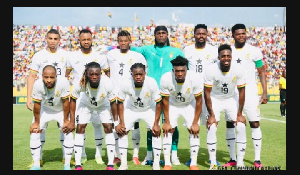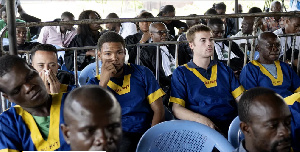- Home - News
- Polls
- Year In Review
- News Archive
- Crime & Punishment
- Politics
- Regional
- Editorial
- Health
- Ghanaians Abroad
- Tabloid
- Africa
- Religion
- Election 2020
- Coronavirus
- Photo Archives
- News Headlines
- Press Release
Press Releases of Tuesday, 15 June 2021
Source: rufina d. pwoawuvi, contributor
30 years after the adoption of the charter: Accelerate the implementation of agenda 2040
The Commission on Human Rights and Administrative Justice (CHRAJ), joins hands with Ghanaian children nationally and on the African Continent to celebrate this year’s Day of the African Child (DAC).
The DAC was instituted in 1991 by the Assembly of Heads of State and Government of the then Organization of African Unity (OAU) in memory of the 16thJune 1976 student uprising in Soweto, South Africa.
At that time, students marched in protest against the poor quality of education they received and demanded to be taught in their own languages. During the protest, hundreds of students were massacred and thousands more were injured.
The DAC serves to commemorate these children and the brave action they took in defense of their right to education. The DAC thus celebrates children of Africa and calls for serious introspection and commitment towards addressing the numerous challenges facing children across the continent. The celebration is expected to be contextualised by Member States as a build-up to the realisation of the rights of children from the family/community level and up to national and international levels.
This year’s continental theme is: '30 Years After The Adoption Of The Charter: Accelerate The Implementation Of Agenda 2040 For An Africa Fit For Children'.
In 2016, the African Committee of Experts on the Rights and Welfare of the Child adopted “Agenda 2040: Fostering an Africa fit for children”-a 25-year agenda for the long-term and strategic progress in implementing children’s rights in Africa.
Agenda 2040 provides a child-centered focus based on the African Union’s Agenda 2063, which highlights children’s rights and welfare concerns. In brief, Agenda 2063 envisions an integrated, prosperous and peaceful Africa, driven by its citizens, representing a dynamic force in the international arena.
It is guided by seven aspirations, and aspiration number six (6) calls for an Africa whose development is people-driven, relying on the potential of African people, especially its women and youth, and caring for children. This aspiration informed the adoption of Agenda 2040.
The African Charter for the Rights and Welfare of the Child (ACRWC) provides for both civil and political rights as well as economic, social and cultural rights. Article 21 (2) of ACRWC provides that “Child marriage and the betrothal of girls and boys shall be prohibited and effective action, including legislation, shall be taken to specify the minimum age of marriage to be 18 years and make registration of all marriages in an official registry compulsory”.
Based on the above provision, the Commission in celebrating this year’s DAC will focus on the challenge of child early and forced marriages (CEFM). CEFM is a practice that violates the rights of children; with disproportionate effect on the girl-child. This practice creates an insidious state of dependency and intergenerational cycle of vulnerability for the affected children.
There exist national laws directly prohibiting the practice of Child marriage. The Children’s Act, for instance, sets eighteen years as the minimum age for marriage, and further outlaws any form of child marriage within Ghana. Any person who acts in contravention of these provisions shall be liable to a fine or to a term of imprisonment or to both.
There are also existing programmes and policies for addressing the issue of child marriage including the National Strategic Framework on Ending Child Marriage in Ghana 2017-2026; Child and Family Welfare Policy; Justice for Children Policy and National Gender Policy.
Moreover, State institutions such as the Ministry of Gender, Children and Social Protection and the Domestic Violence and Victims Support Unit (DOVVSU) of the Ghana Police Service have varying mandates to protect children from early and forced marriages.
Ghana is additionally a signatory to several international instruments that seek to protect the rights of the child including the United Nations Convention on the Rights of the Child (UNCRC).
This Convention sets out civil, political, economic, social and cultural rights of every child regardless of their race, religion or abilities, under which State Parties such as Ghana, are required to meet children’s basic needs and to help them reach their full potentials including life, protection from violence, abuse or neglect and basic education.
Despite the existence of legislation, policies and programmes, the practice of child marriage continues to be practiced unabated. The Commission, in the past three years, received a total of 89 Complaints of CEFM (32 in 2018, 32 in 2019, and 25 in 2020).
The National Strategic Framework on Ending Child Marriage 2017-2026 reports that 1 in every 5 girls in Ghana gets married before 18 years, with emphasis on the percentage of girls between 20-24 years . This translates to a national prevalence rate of 21% .
Specifically, 2% of women aged 15-19, 5% of women aged 20-24 and 11% of women aged 45-49 were married by age 15. Child marriage disproportionally affects girls over boys: among boys aged 20-24 years, 2% were married before the age of 18, compared to 21% of girls.
There is high prevalence of child marriage in rural areas as compared to urban areas, with a rate of 36.2% for the former and 19.4% for the latter . This reflects the general statistics as women in urban areas are indicated to marry 3.5 years later than those in rural areas . Also, girls from poorer households (41.2%) are more likely to be married by age 18 years than girls from richer households (11.5%).
Several factors account for the practice of CEFM, including economic drivers such as incentive to marry out girls to reduce financial burden on the household, customary practice such as girls being given in marriage as compensation and settlement for family or communal issues like debt, social norms and the need to reinforce social ties and perceived protection.
While some parents hold the belief that by marrying their daughters out early, they will be protected from sexual abuse and unwanted pregnancies others also are of the view that marrying their daughters out at an early age helps improve their social status in life.
Other factors are lack of education and employability or livelihood opportunities for girls, lack of knowledge and poor enforcement of laws that protect girls from child and early forced marriage and school dropout.
The practice persists in Ghana because of deep-seated socio-cultural and religious obstructions in the full enforcement and implementation of laws and policies. As a country we must adopt pragmatic measures at retaining girls in school, preventing teenage pregnancy, empowering girls economically, enforcing laws on child marriage as well as designing tailored advocacy programs to educate key stakeholders and adolescent girls on the consequences of child early and forced marriage.
The Commission further calls on the government to reinvigorate through the Ministry of Gender Children and Social Protection (MGCSP) the capacity to coordinate work across relevant actors in the country working on preventing and eliminating Child marriage, provision of legal literacy and livelihood skills to girls at risk and survivors.
To actualize the intent and purpose of SDG 5.3: “Eliminate all harmful practices, such as child, early and forced marriage…” and Art. 21 (2) of ACRWC and other relevant national laws and policies, the Commission calls on government and other key stakeholders to redouble their efforts at ending the phenomenon of CEFM by implementing the relevant recommendations of the Third Cycle Universal Periodic Review, (UPR) which in summary required government of Ghana to put an end to the harmful practice of early and forced marriage in line with Agenda 2030; adopt subnational action plans for strengthening implementation of laws prohibiting the harmful practice of child, early and forced marriage; take steps to fully implement the National Strategic Framework for Ending Child Marriage by allocating adequate resources to the Ending Child Marriage Unit within the Ministry of Gender, Children and Social Protection; and education programmes.











